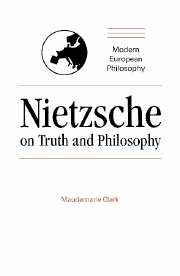Book contents
- Frontmatter
- Contents
- Preface
- Note on texts and citations
- Chapter 1 Interpreting Nietzsche on truth
- Chapter 2 Nietzsche and theories of truth
- Chapter 3 Language and truth: Nietzsche's early denial of truth
- Chapter 4 The development of Nietzsche's later position on truth
- Chapter 5 Perspectivism
- Chapter 6 The ascetic ideal
- Chapter 7 The will to power
- Chapter 8 Eternal recurrence
- Bibliography
- Index
Chapter 5 - Perspectivism
Published online by Cambridge University Press: 04 December 2009
- Frontmatter
- Contents
- Preface
- Note on texts and citations
- Chapter 1 Interpreting Nietzsche on truth
- Chapter 2 Nietzsche and theories of truth
- Chapter 3 Language and truth: Nietzsche's early denial of truth
- Chapter 4 The development of Nietzsche's later position on truth
- Chapter 5 Perspectivism
- Chapter 6 The ascetic ideal
- Chapter 7 The will to power
- Chapter 8 Eternal recurrence
- Bibliography
- Index
Summary
“Perspectivism” is the claim that all knowledge is perspectival. Nietzsche also characterizes values as perspectival, but I shall be concerned here only with his perspectivism regarding knowledge. The latter constitutes his most obvious contribution to the current intellectual scene, the most widely accepted Nietzschean doctrine.
As it is usually interpreted, perspectivism entails that human knowledge distorts or falsifies reality (see section 5). Nietzsche certainly seems to have interpreted it in this way. In TL he appeals to the perspectival character of perception – “that the insect or bird perceives an entirely different world from the one humans do, and that the question as to which of these perceptions of the world is more correct is quite meaningless” (TL 86; WL 884) – to support his claim that truths are illusions. In GS he explicitly identifies perspectivism with the claim that “the world of which we can become conscious is only a surface- and signworld,” from which he concludes that “all becoming conscious involves a great and thorough corruption, falsification, reduction to superficialities and generalization” (GS 354). Interpreted as implying the falsification thesis, however, Nietzsche's perspectivism provides strong evidence against my claim that he overcame his early denial of truth.
Chapter 4's account of Nietzsche's development allows my interpretation to accommodate the passages quoted above since they are not from his last six works.
- Type
- Chapter
- Information
- Nietzsche on Truth and Philosophy , pp. 127 - 158Publisher: Cambridge University PressPrint publication year: 1991



